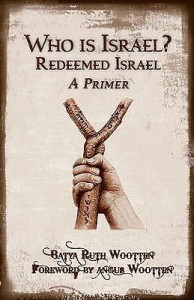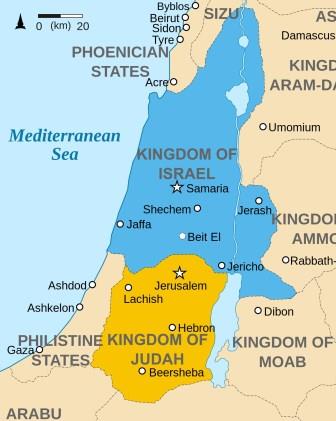Ancient Israel was at its peak during the reigns of King David and King Solomon. Solomon was blessed with divine wisdom from God, constructed a magnificent Temple, and expanded Israel’s influence worldwide. But Solomon married many foreign wives and was drawn into their pagan religions. Because of this, God decreed that the united kingdom of Israel would be divided, and He promised to give Solomon’s servant Jeroboam the ten northern tribes. Only Judah would remain with Solomon’s son Rehoboam.
Then Ahijah took hold of the new cloak which was on him and tore it into twelve pieces. He said to Jeroboam, “Take for yourself ten pieces; for thus says the LORD, the God of Israel, ‘Behold, I will tear the kingdom out of the hand of Solomon and give you ten tribes (but he will have one tribe, for the sake of My servant David and for the sake of Jerusalem, the city which I have chosen from all the tribes of Israel), because they have forsaken Me, and have worshiped Ashtoreth the goddess of the Sidonians, Chemosh the god of Moab, and Milcom the god of the sons of Ammon; and they have not walked in My ways, doing what is right in My sight and observing My statutes and My ordinances, as his father David did (1 Kings 11:30-33).
It is clear that the Northern Kingdom of Israel, also known as Ephraim, separated from the Southern Kingdom of Judah because of Solomon’s idolatry. After Solomon died and Rehoboam came to power in Judah, Jeroboam assumed power in the newly formed Northern Kingdom, and he established substitute worship for the Northern Kingdom Israelites. Ephraim continued in idolatry for the remainder of its history.
Jeroboam said in his heart, “Now the kingdom will return to the house of David. If this people go up to offer sacrifices in the house of the LORD at Jerusalem, then the heart of this people will return to their lord, even to Rehoboam king of Judah; and they will kill me and return to Rehoboam king of Judah.” So the king consulted, and made two golden calves, and he said to them, “It is too much for you to go up to Jerusalem; behold your gods, O Israel, that brought you up from the land of Egypt.” He set one in Bethel, and the other he put in Dan. Now this thing became a sin, for the people went to worship before the one as far as Dan. And he made houses on high places, and made priests from among all the people who were not of the sons of Levi. Jeroboam instituted a feast in the eighth month on the fifteenth day of the month, like the feast which is in Judah, and he went up to the altar; thus he did in Bethel, sacrificing to the calves which he had made. And he stationed in Bethel the priests of the high places which he had made. Then he went up to the altar which he had made in Bethel on the fifteenth day in the eighth month, even in the month which he had devised in his own heart; and he instituted a feast for the sons of Israel and went up to the altar to burn incense (1 Kings 12:26-33).
The Captivity and Dispersion
The prophets often referred to the divided kingdom of Israel as “houses.” Many passages speak of the southern kingdom as the house of Judah. Jeremiah, Ezekiel and Zechariah spoke many times to the house of Judah and the house of Israel. Sometimes the phrase “both houses of Israel” or “whole house of Israel” is used. Often the single term “Ephraim” is used in Scripture to describe the northern house of Israel.
The northern and southern kingdoms remained separate political entities for the next two hundred years. There was some intermingling between them, as some from Ephraim who remained faithful to God joined with the southern kingdom of Judah. In 722BC the Assyrian army attacked and dispersed the northern kingdom, displaced some of the people and intermarried with others. Since that time, the northern kingdom of Israel or Ephraim has been scattered among the nations.
Jerusalem was attacked by the Babylonians and the southern kingdom of Judah taken captive in 586BC. They returned after 70 years of captivity, but during that time period God gave Daniel a prophecy detailing two events: the coming of the promised Messiah, and their end as a nation. Both were fulfilled just as God had spoken. Yeshua (Jesus) the Messiah came and was crucified, buried and resurrected just outside the city. And in AD70, Jerusalem was sacked by the Romans. By AD135, the southern kingdom of Judah and the nation of Israel ceased to exist.
A Future Restoration
The word of the LORD came again to me saying, “And you, son of man, take for yourself one stick and write on it, ‘For Judah and for the sons of Israel, his companions’; then take another stick and write on it, ‘For Joseph, the stick of Ephraim and all the house of Israel, his companions.’ “Then join them for yourself one to another into one stick, that they may become one in your hand.
“When the sons of your people speak to you saying, ‘Will you not declare to us what you mean by these?’ say to them, ‘Thus says the Lord GOD, “Behold, I will take the stick of Joseph, which is in the hand of Ephraim, and the tribes of Israel, his companions; and I will put them with it, with the stick of Judah, and make them one stick, and they will be one in My hand.” The sticks on which you write will be in your hand before their eyes. Say to them, “Thus says the Lord GOD, Behold, I will take the sons of Israel from among the nations where they have gone, and I will gather them from every side and bring them into their own land; and I will make them one nation in the land, on the mountains of Israel; and one king will be king for all of them; and they will no longer be two nations and no longer be divided into two kingdoms.” (Ezekiel 37:15-22)
Earlier in this chapter (Ezekiel 37:1-14) Ezekiel prophesied that Israel, the nation that would cease to exist, the company of people that would become nothing more than a pile of dead, dry bones, would once again live and would once again have the Spirit of the LORD. Here in this passage, Ezekiel prophesied that the two houses of Israel would be brought back together under one king.
This prophecy of the literal, physical reunification of Israel remains unfulfilled. Either at or just prior to the return of Messiah Yeshua, the scattered houses of Judah and Israel/Ephraim will be reunited under one king. Ezekiel called him “David” (Ezekiel 37:24), though King David has long been dead – he was even dead when Ezekiel prophesied. This prophecy uses the reference to King David to describe the son of David, the King of Kings, Yeshua the Messiah.
The restoration of the Whole House of Israel is essential to the Gospel message, and it affects you regardless of your ethnic heritage.
You can continue reading more about the Two Houses of Israel here.

